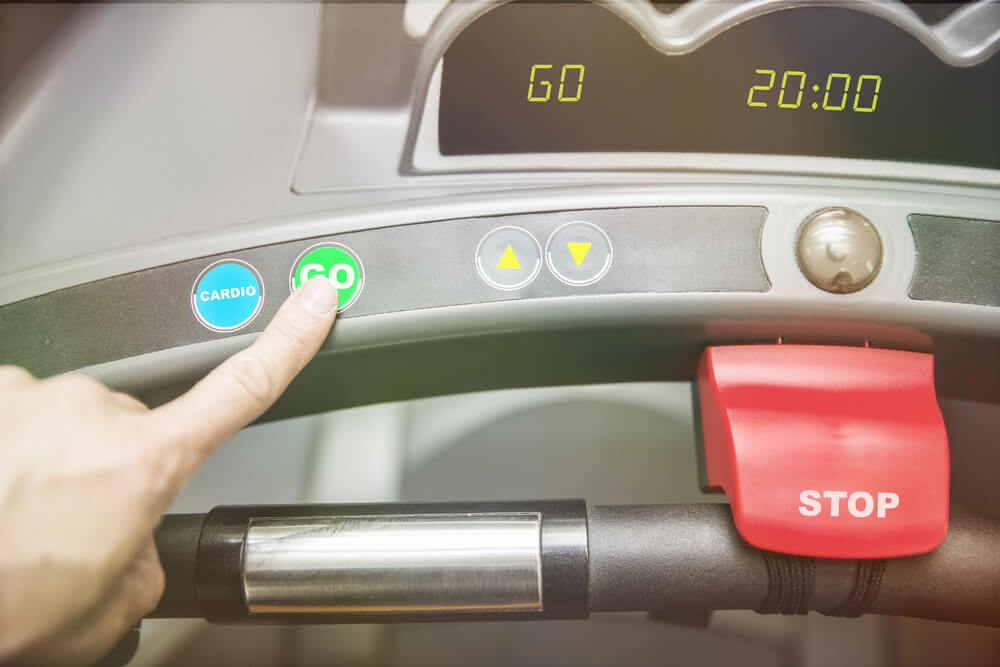
Raise your hand if you love running!!! We wouldn’t be surprised if we were met with some pretty silent responses with that question. Have you heard of interval training?
While there is the occasional running-lover here and there, running isn’t exactly something many people look forward to.
People talk about a runners high, loving running, doing 26 miles…but this just isn’t for everyone.
Whether you find it exhausting or just plain old boring, running is known as the go-to for weight loss. So what are the anti-runners supposed to do to drop a few pounds?
Here’s where the good news comes in. If you hate running, you don’t have to spend hours and hours sweating like a pig on the treadmill. And you also don’t have to sprint around your neighborhood to try and drop the weight.
Actually, spending hours running could possibly have some bad health issues pop up – and we’re going to help you avoid them.
There’s a specific kind of advanced training that works to burn calories even more successfully than just plain old cardio. But the benefits don’t stop there. Rather, it keeps going, as it increases your aerobic breathing capability significantly more than boring cardio. And finally, it adds in bursting your ability to reach your maximum sprint speed.
What is this magical thing called?
Welcome to Interval Training
(Please note: you should be in decent shape before you attempt to partake in interval training).
Now look – we aren’t anti-cardio. We don’t have anything personal against it. But just running at the same pace, every day, for hours at a time isn’t going to give you the results you want.
And who wants to head out for a run and stay out there for 3 hours at a time? It just isn’t doable for everyone.
Plus, a lot of people suffer from things like shin splints or even feeling sick when they decide to run for longer periods of time. There are a lot of solid claims against cardio, so let’s go back to how to do intervals.
In a nutshell, interval training is when you change up both your intensity and speed. The major differing factor from plain old cardio is you’re doing a shorter run.
So let’s say you head out for a run. Well, the first 4 minutes are going to be spent doing a lighter jog. Then, you want to switch it up and push yourself as hard as you can for 60 seconds, then go back to the lighter jog. Generally, the overall time frame for this is 20 seconds, so you want to keep this cycle on repeat for the entire 20 minutes.
Sounds pretty doable, right?
Not only is it within your ability, but it is also very successful. Interval training does a great job at burning tons of calories while also beefing up your oxygen volume during exercise.
And here’s perhaps one of the biggest perks of interval training – the afternoon effect. This means that your metabolism is going to keep running at a higher level hours after you’ve finished up exercising.
What does that mean?
Think about it this way – what is your heart? It’s a muscle. So if you just let it stay at its usual rate, and never pushing it outside of its limits, your heart will never get any growth. Same goes for the other muscles in your body. If you decide to do 100 bench presses with only 15 pounds, you are never going to get the chest of your dreams.
Makes sense?
Your heart needs to be on the same page – you’ve got to feel the exertion in order to work harder and get changes.
When you add some intervals into the mix, your heart is obviously going to be pumping a lot harder, trying to get back to its comfort zone.
Plus, interval training is going to give you a better physique overall.
After all, is that one of the top reasons why you’re exercising in the first place?
To look better?

When you aren’t running for hours a day, there’s going to be more room (and energy) to do other exercises, like weight training.
There are also plenty of studies that show interval training is going to help out your anaerobic and aerobic capacity. That’s basically a two for one deal right there. Dr.Tabata has referred to a famous study done on both high-intensity and moderate training levels – and that’s what helped us nail this down to a science. He points out that this study was able to push us away from the continual cardio and focus more on conducting higher intensity workouts.
The various studies show that the higher intensity and intermittent training gives your anaerobic and aerobic body systems a major boost. When you do aerobic exercise, it only helps your aerobic system, so there is a major piece missing. Anaerobic is more intense.
Now that you’ve got the basics down, you might be ramping up and ready to get going, so we’re going to tell you how exactly to get started with interval training.
First, we will give you a sort of sample for the guide in terms of running to get started with interval training.
No need to dive in headfirst. Like we said, you aren’t going to have to spend hours and hours running. Instead, we suggest you start with running 3 days a week. Even people with the busiest of schedules can manage this. And if you do interval training right, your body is going to need about 2 days to recover from the exercises you do.
If you push yourself and try to do more than 3 days, you might burn yourself out. Just remember that even on the days you aren’t exercising (aka your “off” days) your body isn’t just sitting idly. Rather, you’re still burning calories and fat during this time off. So that means even if you’re sitting in front of the television or playing your favorite video games the next day, you’re still burning calories.
Do I Need to Warm Up For Interval Training?
As for a routine, we’ve got that planned out for you. As always, you want to start with a warm up. Aim for this to last about 5 minutes. Start with some light walking, and then burst up the speed a little bit. You want your legs to get warmed up, along with your heart. And then you want to go right into stretching. However, it’s important that you don’t stretch until you are nice and warmed up.
This is a critical step a lot of people miss.
We can help put things in perspective for you. Imagine your muscles are just like rubber bands. They stretch and bend and have an elastic-like consistency. If you start pulling on a brand new rubber band that hasn’t even been used once, it’s going to snap.
Not exactly the most charming picture to think of when it comes to your muscles. But you want to get your muscles ready for what you’ve got coming for them. So warm the up and get them moving around, then go right into stretching. If you follow this for every exercise, you will be good to go.

Interval Workout
For the first 30 seconds of your workout, you want to aim for a more increased pace, putting 70% of your max effort into it. Then, once you’ve hit this, switch yourself down for two minutes of a slower pace.
After that, you’re going to boost it up a bit. While you’re going to do 30 seconds again, this time you want to be at 75% of your total effort. Then, switch back down to 2 minutes of a slower pace.
After those two minutes are up, you’re going to turn it back up to 30 seconds at a quicker pace. However, this time, you want to use 80% of your maximum effort. We’re going to keep boosting it up, so make sure your measurements are correct. You don’t want to completely exert yourself and end up not making it through the workout. It may take a few sessions to get the feel down but once you have it down, you’re golden.
OK, back to the routine. You might see the path we’re headed toward – after those 2 minutes of a slower pace are over, go back up to 30 seconds of a faster pace. With this one, go for 85 % of your max effort. Then, 2 minutes of a slower pace.
We’re slowly but surely working our way up to 100% of your effort. So do another 30 seconds of a faster pace, but now, you’re going to use 90% of your total effort.
Give yourself a rest with another 2 minutes of a slower pace. Then go back up and use 95% of your max effort for 30 seconds.
Make sure you take these 2 minutes of a sort of “break,” when you’re doing these slower paces.
Now finally, you’re going to do 30 seconds at a faster pace, but this time, you’re using 100% of your max effort. Since you’re almost done with the workout, make sure you put your all into this. Go as hard as you can for 30 seconds. And like every other step before, you’re going to end with 2 minutes of a slower speed.
You made it.
Now, take 5 minutes to do some easy jogging. You need to add some stretching into this 5-minute window as well. As you stretch out your body, your muscles are going to be expanding. This matters because it’s going to fill in any gaps (that have been made empty via exercise) with all the nutrients you’re going to eat.
Plus, stretching helps keep your muscles nice and loose, so the odds of you getting an injury are going to decrease.
Let’s just say this is your very first time doing intervals. It might be pretty freaking hard to get through the entire routine. If you’re struggling or feel like you need to work yourself up to it, just focus on doing each interval as strongly as you can. What this means is really pushing yourself when you hit those 30 seconds. You don’t have to do all the intervals, either.
How Many Intervals Do I Have To Do?
If you feel like you can only do 4, that’s fine. Do 4 and make your goal 5 intervals next time. You don’t have to switch up every single time, either. If you feel like you need a couple extra sessions, you can do a couple different sessions with 4 intervals before you move up to 5.
Unfortunately, we can’t tell how exactly how fast you need to run.
Why?
Because it varies depending on the person. Let’s say you aren’t in the best shape. Well, that 2 minutes of a decreased pace might be just a walk and 30 seconds of jogging instead of sprinting.
However, if you’re in pretty good shape or have done interval training before, your 2 minutes may be jogging, with your 30 seconds being some pretty fast sprinting.
Regardless, one thing is for sure – by the end of this cycle, you should feel like you’re going to die. And by die, we mean absolutely covered in sweat, out of breath, barely able to hold a conversation.
If you aren’t, you need to push yourself more.
Conclusion
No need to worry if you can’t get outside to do some interval training. You can do it on a treadmill too. Just be careful that you don’t push yourself too hard with the ‘interval setting’ most treadmills have. Start slow and get a feel for it before you go too fast. Exercise bikes work great for interval training too. You just want to make sure to really push it during those 30 seconds of increased speed.
Think about it – this is seriously 15 minutes worth of an intense exercise. But when it comes down to it, you’re only doing 3 minutes of a crazy, hardcore exercise.
-Terry Asher
Terry
Latest posts by Terry (see all)
- How Important Are Net Carbs For Building Huge Muscle? - Apr 28, 2017
- The Matt Damon Workout Explained - Apr 27, 2017
- Watercress – Benefits And The Best Way To Consume It - Apr 26, 2017











[…] way is, of course, eating more protein. Because of the boost in metabolism you’re getting, and because the extra muscle density will help to burn calories faster, people […]
[…] way is, of course, eating more protein. Because of the boost in metabolism you’re getting, and because the extra muscle density will help to burn calories faster, people […]
[…] way is, of course, eating more protein. Because of the boost in metabolism you’re getting, and because the extra muscle density will help to burn calories faster, people […]
[…] way is, of course, eating more protein. Because of the boost in metabolism you’re getting, and because the extra muscle density will help to burn calories faster, people […]
[…] way is, of course, eating more protein. Because of the boost in metabolism you’re getting, and because the extra muscle density will help to burn calories faster, people […]
[…] Additionally, by reducing stress and inflammation, we are able to increase our ability to burn body fat. And we are also reducing the amount of metabolic adaptations that are actually slowing down our metabolism. […]